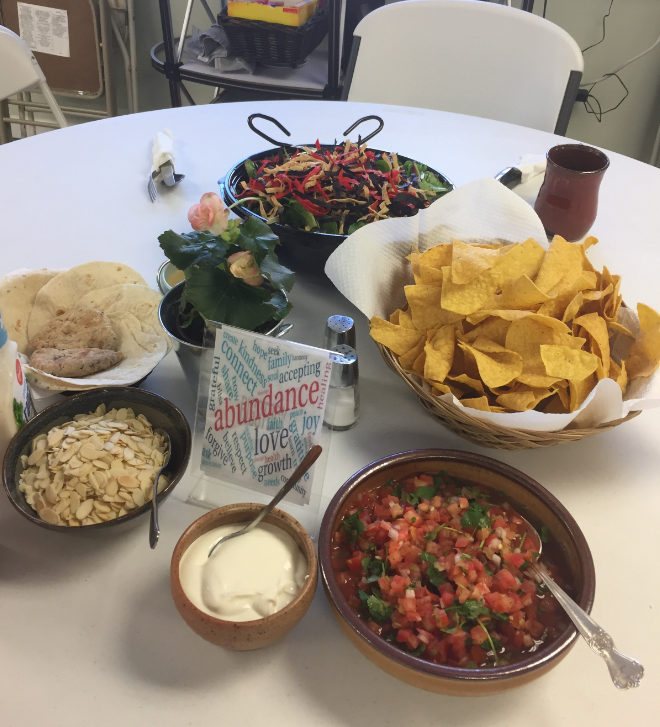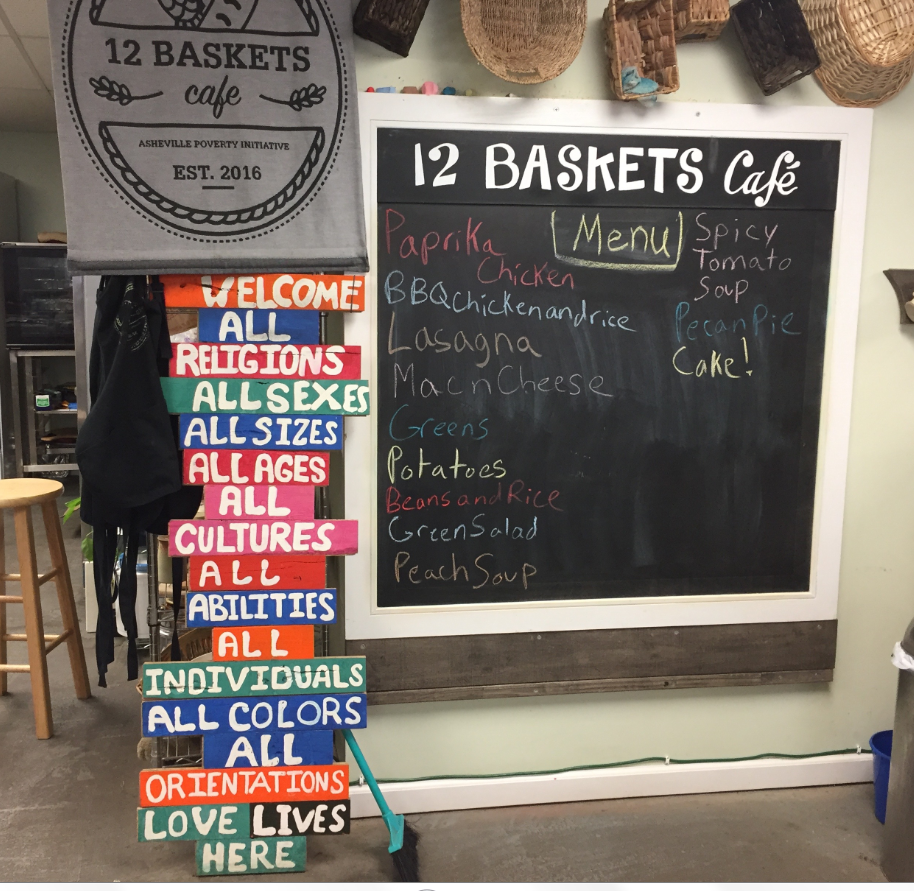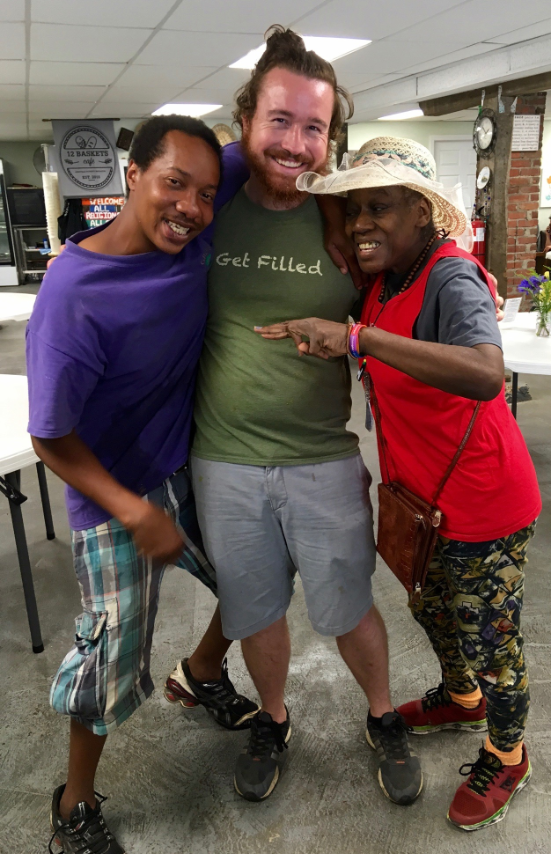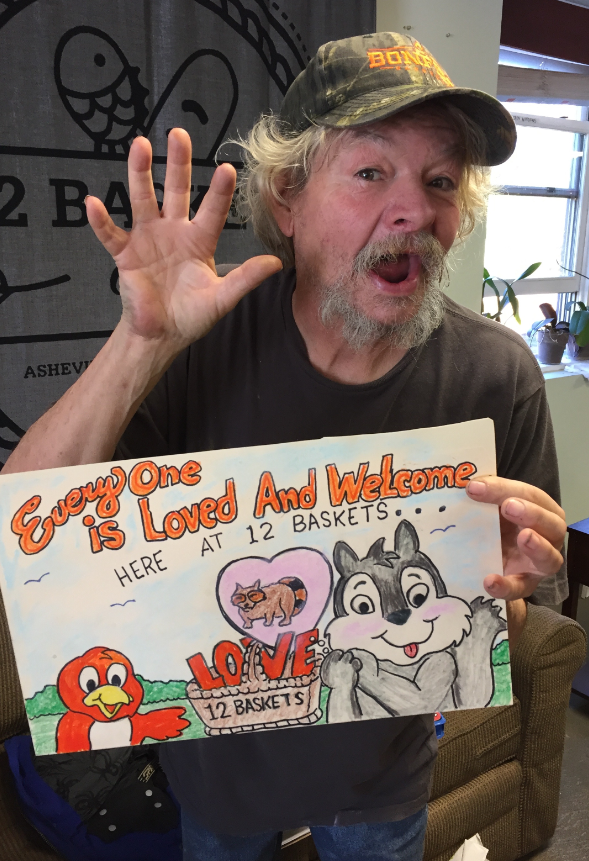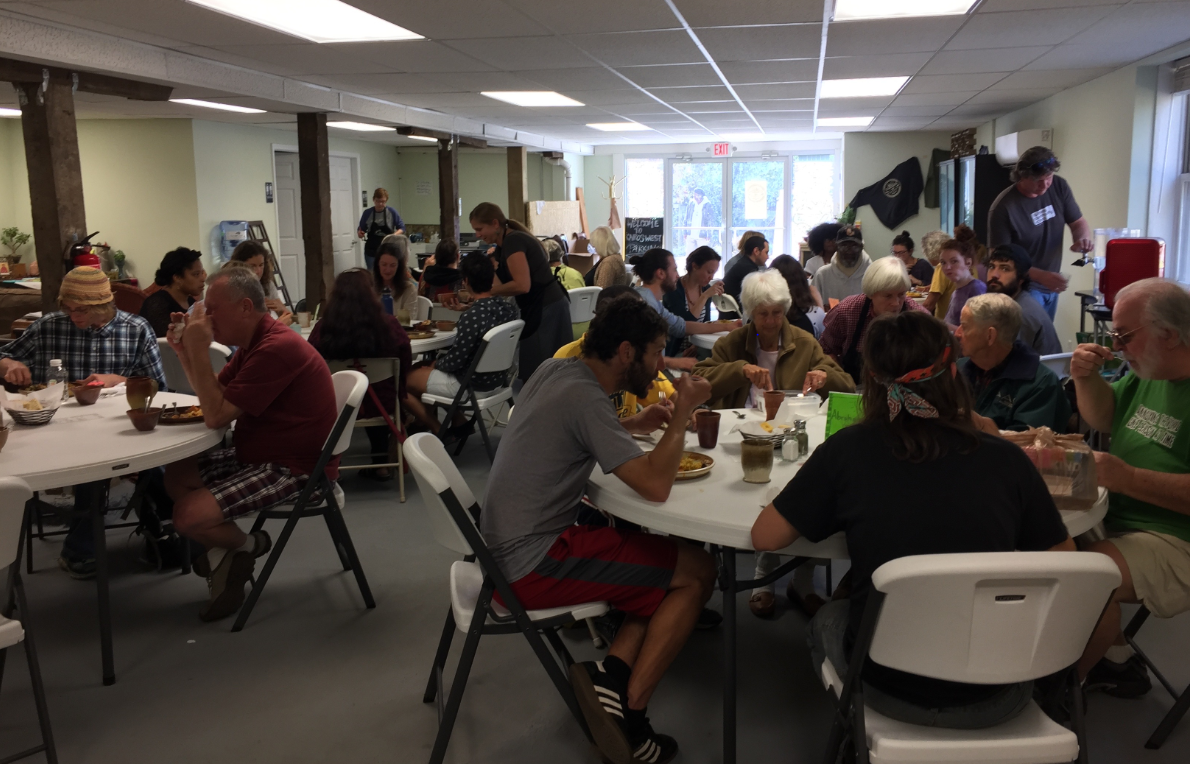Asheville’s 12 Baskets Café is love of neighbor in action
At midday Monday through Friday, a community of people from all walks of life in Asheville, North Carolina gather for a meal at the 12 Baskets Café. All who are hungry are invited to eat their fill, celebrate their God-given gifts, sharing 100% rescued food that otherwise might have ended up in a dumpster.
The Café, a ministry of the Asheville Poverty Initiative founded by the Rev. Shannon Spencer, is changing lives. It’s a visible witness—of love of neighbor, and of Jesus’ gift of communion.
“What she is doing has helped bring me back to the church. Moreover, what she has created I would call church,” said Fran Durden, a volunteer/companion at 12 Baskets. “Folks at the Café are a caring community like those found at most traditional churches. We greet each other with hugs and ask after each other — if someone hasn’t been to the Cafe in a while, I notice and ask after them — want to make sure they are ok. We lift each other up and celebrate each other.”
12 Baskets has recreated the model of the traditional soup kitchen, serving high-quality prepared but untouched food donated daily by more than a dozen local restaurants. Volunteers, called companions, pick it up and get it ready to share.
“We are bearing witness to God’s abundance,” said Spencer, director of the Asheville Poverty Initiative. “Our cultural narrative is one of scarcity. But the good news that there is absolutely enough. The Café illustrates that. All of this amazing food that somebody prepared is getting thrown away. What we have done is established an alternative social space where everyone is welcome and is invited to come because we all hunger in some way; for nourishment, for community, for a purpose, to be seen. We all come in hunger and we all get filled at the Café.”
Spencer got the idea for 12 Baskets after meeting some folks on the street. People who have been marginalized based on what they have, or don’t have. “After getting to know them, those friendships impacted my theology and the way I understood scripture,” she said. “It made me question how church does outreach.”
The UCC minister began talking to people in the churches with whom she had relationships. What would it look like to have ways to engage with those who are marginalized in ways that are equitable? Eliminating the models that divide — with the ‘haves’ helping the ‘have nots.’ Models that allow those who come from a place of privilege “to segregate our brothers and sisters as only the needy ones. In our relationships at the Café, we step out from behind the counter and be with.”
Spencer got started feeding people after she was approached by the founder of Food Connections, a local service that aims to keep nutritious food from ending up in a landfill.
With a partnership with Food Connections, Spencer originally hoped to create a place to have a meal in a local fellowship hall in low-income area in the city, but found many churches didn’t have the extra space. So she took a card table from her basement, and began serving people from the back of a van.
In October 2016, the ministry moved into a storefront in West Asheville, offering a free lunch a couple days a week. The Café continues to grow through the power of community. After companions pick up or receive food from restaurants, bakeries, caterers and grocery stores, they serve meals restaurant-style, everyone is invited to eat their fill.
“In the past 21 months, I’ve been doing food pickups twice a week,” Durden said. “After dropping off the food at the Café, I stay around to help wherever help is needed; as a server, dishwasher, kitchen worker. I can think of no better way to serve my God than to ask others to help those in need through the ministry at 12 Baskets Café.”
The name 12 Baskets, Spencer said, refers the Bible story with Jesus feeding the crowd of 5,000 with the loaves and fishes. “That was a horizontal miracle with God, Jesus and community. Everybody shared, got fed, and there was still 12 Baskets left over.
“It’s about everybody saying ‘this is how I can help,'” Spencer continued. “I see my theology of communion being lived out. A ritual that forms as God’s manna people. Communion reminds of us of when God’s trying to reconstruct Pharaoh’s economic system. A new way of living. Take what we have been given, give thanks, break it up and pour it out. A way of sharing, and no one goes without.”
Even though the Café is collecting donations from just 10% of the restaurants in Asheville, they still have 5 freezers full of food, and hope to feed even more people.
“What we are hoping to do is create a model that can be adapted,” Spencer said. “It’s a sin that we are throwing away food when people are hungry.” She’s put together a manual and how-to video that can help interested organizations through the process.
“For us, the hardest part was finding space,” she said. “We pay rent. People donate what they can when they can. Some days we have less than a dollar, some days we have fifty. We dig nickels out of the bottom of the box, but we make rent every month. Thanks be to all that is holy, it’s working.”
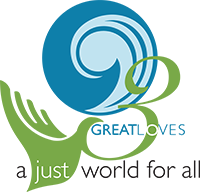 This story, highlighting the ministry of a local church, is part of the UCC’s 3 Great Loves campaign, seeking to build a just world for all as one united church. Visit 3GreatLoves.org to learn how we’re showing Love of Children, Love of Neighbor, and Love of Creation.
This story, highlighting the ministry of a local church, is part of the UCC’s 3 Great Loves campaign, seeking to build a just world for all as one united church. Visit 3GreatLoves.org to learn how we’re showing Love of Children, Love of Neighbor, and Love of Creation.Related News
A Moment of Silence
The weekend news was alarming. Two students shot and killed with 9 injured at Brown University...
Read MoreIn hope-filled worship service, UCC and United Church of Canada celebrate full communion past and future
On Saturday, Dec. 13, many from the United Church of Christ (UCC) and the United Church of...
Read More‘A Gift of God to the World:’ Christmas greetings from the General Minister and President
As Christmas quickly approaches, UCC General Minister and President/CEO the Rev. Karen Georgia...
Read More